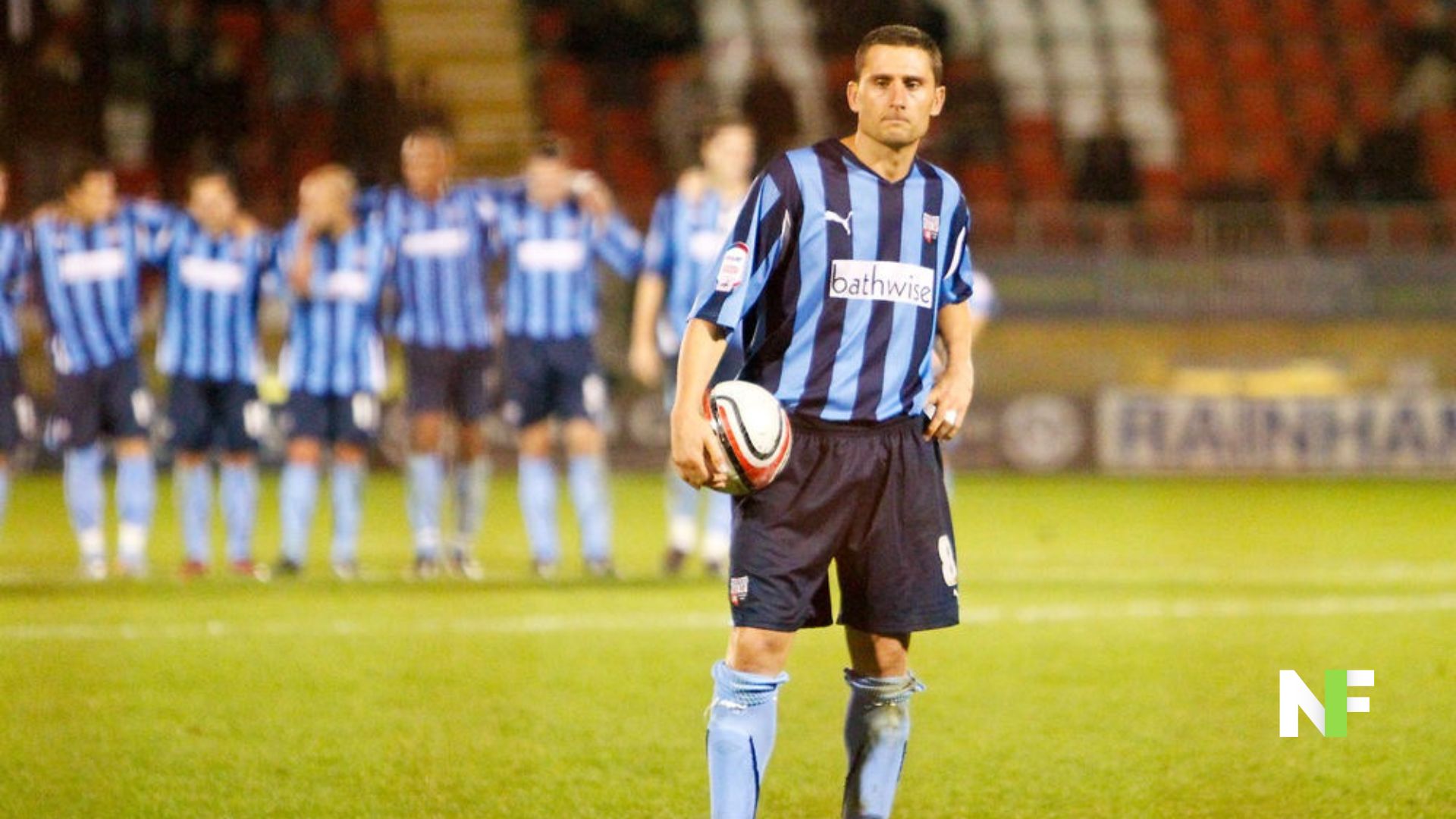Get in touch
Thanks for getting in touch

The Hidden Story in Pro Football – and Why It Matters in Every Workplace
I’m a bit of an outsider in the world of professional football
I always was
A bit different
I stayed away from the pubs and clubs, opting for early nights and Evian
Those in the dressing room probably loved and loathed me in equal measures, and I was at ease with that.
In and around players I blew my own trumpet, reminding everyone of my career stats in terms of goals and games, it was deliberate.
I never forgot and I made sure they never did either – 727 games & 222 Goals
But outside of the game, I was always more silent, more reserved.
One of my character traits is to rarely look back in life, always looking at the next thing.
Sometimes, you can forget to admire the view from the top of the hill
It’s doesn’t always serve me well, which is why I work on this area
I spent 20 years in professional football.
I played 727 games.
That puts me in the top 0.1% of appearances by a player in the UK.
I scored 222 career goals
Fewer than 0.5% of all players who have played in England’s top four professional leagues have scored 200+ career goals.
I’ve seen every aspect of the game from the inside, the dressing room highs, the career-changing lows, and everything in between.
An experienced coach once described professional football as
“A great game, and a shit business”
It’s a brutal world

Recently, I posted about the rise of snus and vapes in professional football.
It hit a nerve, because while some people think this is a “player choice” issue, I know it’s a symptom of something bigger.
A study found that snus use is widespread among professional footballers, with many using it to “unwind” from the pressures of the game. It’s not just about nicotine, it’s about stress management.

And the stress is real.
26% of current male pros reported experiencing anxiety and/or depression.
22% reported lifestyle issues that, in most other industries, would trigger an occupational therapy referral.
Yet, there’s a distinct lack of perceived support in the industry.
I spoke recently to the CEO of a Football League club.
His response?
“We’ve banned it at the club, so it’s not a problem for us.”
Really? If that’s true, you might be the only club in the country where players aren’t using it. I’m not convinced.
And if you think this is just a men’s game issue, it won’t be long before the women’s game sees similar numbers.
They’re closing the gap on the pitch, and these off-pitch pressures will follow.
To make matters more interesting, the next trend is already knocking on the door with a growing number of US teenagers using caffeine pouches for an instant energy hit.
Experts expect this will cross the Atlantic soon.
Why do players turn to this stuff?
Money. Fame. Status.
You’d think that equals happiness. But behind the scenes there’s stress,
Enormous amounts of stress, anxiety, and fear – fear of injury, of losing form, of losing your place, of not living up to the expectations.
The evidence of increased stress in the professional game is everywhere, and it’s shows in performance.

One clear example is the decline in penalty conversion rates since the introduction of VAR. Approx 10% decline
Why?
Because players are now waiting longer to find out if the penalty will be awarded, giving them more time to overthink, to ruminate over negative outcomes, and build pressure.
This extended wait creates a shift in control.
It takes the control form the taker and places it elsewhere
That loss of immediate control adds to the tension, increasing anxiety and disrupting focus.
The result?
More missed penalties, not because of poor technique, but because of heightened stress and reduced psychological control in the moment.
On an average premier season approx. 100 penalties are awarded, that’s 10 more being missed each year on average due to VAR.
So, for a start, I’m not saying ban snus. Far from it.
Players need it
This isn’t about control, it’s about support.
The answer?
It’s already out there.
One of my former clubs, Brentford FC, gets this.
They’re a brilliantly run club, on and off the field, under the leadership of Matthew Benham.

They use Michael Caulfield (and his trusted greyhound, Paisley), who works with the club, offering a safe space for players to open up to their concerns, stresses and anxieties. Human to human connection through conversations about anything, literally anything, “I’ve got the list” he says “anxiety, racism, divorce, miscarriages, it is an absolute A-Z.”
It’s simple, but brilliant
Caulfield himself is brilliant
A class act
My first encounter with Michael was asking for a chat with him, he obliged and several days later we jumped on a 30 minute online-chat, which lasted, ironically) for the full game of football – 90 minutes.
He explains his approach to his work recently in a social media post:
“Basically, I am doing nothing. But sometimes doing nothing is the right thing to do, because it can lead to so many good things down the line. As the season unfolds, with the inevitable twin imposters,
( a reference to Rudyard Kipling’s poem ‘If’ the two imposters being triumph (success) and disaster (failure). Kipling calls them impostors because neither success nor failure fully defines a person, both are temporary)
those moments of doing nothing will hopefully enable me to help if needed.”
He calls it “leaving breadcrumbs”, being there, building trust, so that when a player is ready to talk, the door is already open.
Another of my former clubs, Brighton, runs with the same philosophy, looking after the person, not just the player.
This isn’t just football, it’s the workplace
The pressures footballers face are different, but the human impact is the same as in any high-performance environment.
People under pressure turn to coping mechanisms.
Sometimes those mechanisms are healthy. Often, they’re not.
Like everyone, I’m not exempt. I run my own coaching business, and the stressors of that, combined with everyday family life, are ever-present. As a result, I have to manage them carefully with my own coping mechanisms. For me, exercise, being outdoors, creating separation, and listening to music help more than anything else. A long run through the trails is both mobile meditation and medication for me.
Mental health is extremely complex, and I’m not for one minute saying that I am a specialist, but we all have mental health, everyone has mental health, and this much we do know, nobody wants to struggle with mental health issues, nobody wants to be off work with mental health issues, nobody doesn’t want to live a life of fulfilment because of mental health issues, they don’t want to struggle with the routine of life, they don’t want to find it difficult to speak about their issue, for fear that no one will listen, or will not understand, or will manage them out of their positions, the worry about support and a support system within an organisation is very real.
So, we struggle in & we struggle on, filling up our stress bucket more and more until we get to that point where we simply can’t cope and are forced to speak out and ask for support.
Many are signposted to the GP and simply signed off for two weeks. I’ve heard a case recently where a junior lawyer was signed off by their GP and given medication after a consultation lasting no longer than two minutes, 120 seconds, signed off and given antidepressants, told to go home relax, watch some daytime television, with some tablets they couldn’t pronounce, do you know how scary that thought is . . . . .
3 hours with ‘This Morning’, it’s enough to drive anyone mad.
We need separation, yes
But we also need connection, deep rooted conversations about what’s really going on in our lives.
About stress, fear, identity, purpose.
Conversations that actually open the door to honesty.
Because without connection, separation just becomes isolation which is where the real problems start.

That’s exactly why I created the Salus Employee Assistance Programme, to give people an outlet, a place to talk, and the right tools to manage stress before it spills over into something worse.
Over the past three years, I’ve had the privilege of working with organisations both here in the UK and across the US, supporting leaders, teams, and individuals in high-pressure environments.
Whether it’s boardrooms or dressing (locker) rooms, the challenges are often the same, silent stress, running close burnout, and a culture where asking for help still feels like weakness.
Salus is designed to shift that.
To make support visible.
Accessible.
Normal.
If football can start catching up, so can business.
The question is… will your organisation wait until there’s a problem, or will you start leaving breadcrumbs now?
If you want to talk about how we can make that happen in your organisation, message me.
Disclaimer: Brentford FC and Michael Caulfield were not involved in the writing of this article, nor do they endorse the views or content expressed.
Be the best version of you
Your journey to a brighter future starts here
Book a Discovery Call with Nicky